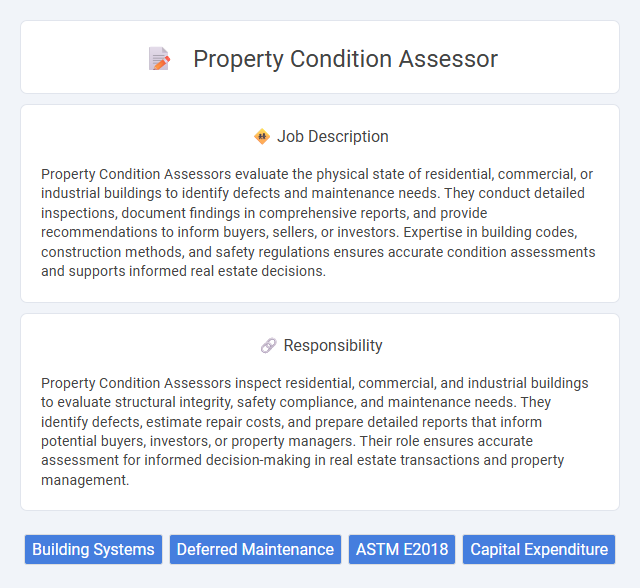
Property Condition Assessors evaluate the physical state of residential, commercial, or industrial buildings to identify defects and maintenance needs. They conduct detailed inspections, document findings in comprehensive reports, and provide recommendations to inform buyers, sellers, or investors. Expertise in building codes, construction methods, and safety regulations ensures accurate condition assessments and supports informed real estate decisions.
Individuals with strong attention to detail and analytical skills will likely be suitable for a Property Condition Assessor role, as the job demands thorough inspection and evaluation of properties. Those comfortable working independently in diverse environments may have a higher probability of success given the field-based nature of assessments. Candidates who prefer routine tasks or lack interest in physical site visits may find this position less compatible with their strengths and preferences.
Qualification
A Property Condition Assessor must possess strong knowledge in building systems, construction methods, and regulatory codes, often supported by a background in engineering, architecture, or construction management. Professional certifications such as Certified Property Condition Analyst (CPCA) enhance credibility and demonstrate expertise in evaluating structural integrity and identifying maintenance needs. Experience with property inspections, report writing, and familiarity with relevant software tools are essential qualifications for accurately assessing real estate asset conditions.
Responsibility
Property Condition Assessors inspect residential, commercial, and industrial buildings to evaluate structural integrity, safety compliance, and maintenance needs. They identify defects, estimate repair costs, and prepare detailed reports that inform potential buyers, investors, or property managers. Their role ensures accurate assessment for informed decision-making in real estate transactions and property management.
Benefit
Property Condition Assessors likely enhance investment decisions by providing detailed evaluations of buildings' structural integrity and maintenance needs. Their expertise probably reduces risks associated with property transactions and long-term ownership costs. Employers could benefit from improved asset management and timely identification of necessary repairs or improvements.
Challenge
A Property Condition Assessor likely faces challenges related to accurately evaluating complex structural issues within limited time frames. The role probably demands staying updated with evolving building codes and regulations to ensure precise assessments. Managing client expectations while delivering detailed, unbiased reports may also pose significant difficulties in this field.
Career Advancement
A Property Condition Assessor plays a critical role in evaluating the physical state of residential and commercial properties, providing detailed reports that influence investment and maintenance decisions. Career advancement opportunities include moving into senior assessor roles, project management, or specialized consulting positions within real estate development and insurance industries. Gaining certifications such as Certified Property Inspector (CPI) or Building Analyst enhances professional credibility and opens pathways to leadership and higher-paying roles.
Key Terms
Building Systems
A Property Condition Assessor specializing in Building Systems evaluates HVAC, electrical, plumbing, and structural components to determine their current condition, functionality, and code compliance. Utilizing detailed inspections, diagnostic tools, and maintenance history analysis, they identify deficiencies and potential risks that impact asset value and operational efficiency. Their expertise supports accurate property valuation, capital expenditure planning, and risk mitigation for real estate investors and facility managers.
Deferred Maintenance
A Property Condition Assessor evaluates deferred maintenance to identify and quantify the backlog of repairs needed for a property's structural, mechanical, and cosmetic elements. This assessment critically impacts investment decisions by detailing the severity and cost implications of deferred maintenance items. Their expertise ensures accurate budgeting for future capital expenditures and helps mitigate risks associated with property deterioration.
ASTM E2018
A Property Condition Assessor performs thorough evaluations of commercial real estate to determine the property's physical and structural condition guided by ASTM E2018 standards. This ASTM guideline provides a systematic framework for conducting property condition assessments (PCA), ensuring consistent identification of deficiencies and capital needs. Professionals skilled in ASTM E2018 contribute critical data for investment decisions, risk management, and property maintenance planning.
Capital Expenditure
A Property Condition Assessor evaluates building infrastructure to identify necessary repairs and maintenance, emphasizing accurate assessment of Capital Expenditure (CapEx) requirements. They analyze structural elements, HVAC systems, roofing, and electrical components to forecast significant future investments and budget planning. This role supports property owners and investors in making informed decisions about long-term asset management and renovation priorities.
 kuljobs.com
kuljobs.com